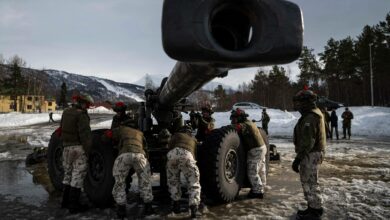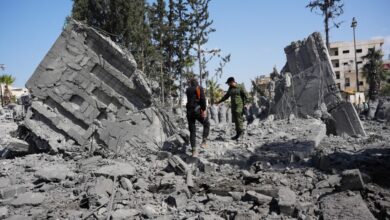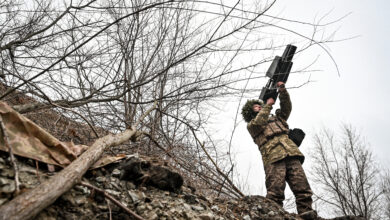Finland freezes arms export permits to Saudi Arabia and UAE over Yemen
Finland will not issue new arms export authorizations to Saudi Arabia and the United Arab Emirates due to the humanitarian situation in Yemen, the Ministry for Foreign Affairs said.
“The Government discussed arms export matters and decided that in the current situation there are no foundations for new arms export authorizations to Saudi Arabia or the United Arab Emirates,” the Thursday, November 22 release said. “In its deliberations, the Government laid stress on the alarming humanitarian situation in Yemen, in particular.”
The two Persian Gulf states lead an alliance that intervened in Yemen’s civil war in 2015, supporting President Abd Rabbo Mansour Hadi’s government against the Iran-backed Houthi rebels.
The grinding war has caused growing international outcry, particularly after a string of high-profile coalition strikes that have killed scores of civilians, many of them children.
Finland joins Denmark, Germany and Norway, who all recently froze arms arms exports to Saudi Arabia over Yemen and the murder of high-profile Saudi journalist Jamal Kashoggi in Istanbul.
“Finland’s arms export is based on a careful case-by-case discussion,” the ministry said, adding that it “observes the European Union’s arms export criteria, in which special attention is paid to human rights and to the protection of regional peace, security and stability.”
The UAE was Finland’s biggest arms export customer in 2017, according to a foreign ministry report. Eleven export licenses were issued, valued at €36,352,120 ($41.5 million). Saudi Arabia was granted three permits, valued at a total of €1,508,970 ($1.7 million).
The total value of realized exports from Finland in 2017 was €106.4 million ($121.4), a drop of around 20 percent on 2016. The UAE accounted for 8.4 percent of those exports, valued at €8.9 million ($10.2 million), while Saudi Arabia accounted for almost 5 percent at €5.3 million ($6 million).
Arms exports under the spotlight
Finland is the latest country to review its exports to Saudi Arabia and the UAE as international attention focuses on Yemen prompted by warnings that the humanitarian situation for millions of Yemenis could worsen.
Forces part of the coalition led by Saudi Arabia and the United Arab Emirates have lately renewed their advance on Yemen’s port city Hodeidah, prompting fears that the critical port will be cut off.
The World Health Organisation says nearly 10,000 people – mostly civilians – have been killed in Yemen since the Saudi-led intervention began, but human rights groups believe the toll may be five times higher.
The World Food Programme says up to 14 million Yemenis are at risk of starvation.
Save the Children said on Wednesday that some 85,000 children under the age of five may have died of severe malnutrition or related diseases between March 2015 and this October.
Earlier Thursday, Denmark’s foreign minister said it will suspend exports of military equipment to Saudi Arabia due to concerns over the situation in Yemen and Khashoggi’s murder.
Germany on Tuesday bowed to pressure to halt arms sales to Saudi Arabia and cancelled a deal for the delivery of 20 warships. Germany’s arms exports to Saudi Arabia topped $105 million last year.
On November 9, Norway said it would freeze all defense material export licenses to Saudi Arabia, including those for dual-use items.
But some countries have stuck by the kingdom rather than use lucrative arms deals. In September, Spain said it will go ahead with the delivery of 400 laser-guided bombs to Saudi Arabia, after earlier saying it would block the sale. The u-turn came amid concerns that cancellation of the deal could have jeopardized a €1.8 billion order of five Corvette warships.
U.S. President Donald Trump spoke out Tuesday in support of Saudi Arabia, citing Riyadh’s weapons purchases and support for the administration’s campaign against rival Iran.
“The United States intends to remain a steadfast partner of Saudi Arabia to ensure the interests of our country, Israel and all other partners in the region,” Trump said in a statement issued by the White House.
That came less than a fortnight after Saudi Arabia ended a controversial aircraft refueling arrangement with the United States on November 10, halting a key part of Washington’s involvement in the Yemen conflict.
U.S. Secretary of Defense Jim Mattis said he supported Saudi Arabia’s “decision” after the official Saudi Press Agency said the coalition asked for the “cessation of inflight refueling support” from the United States.












